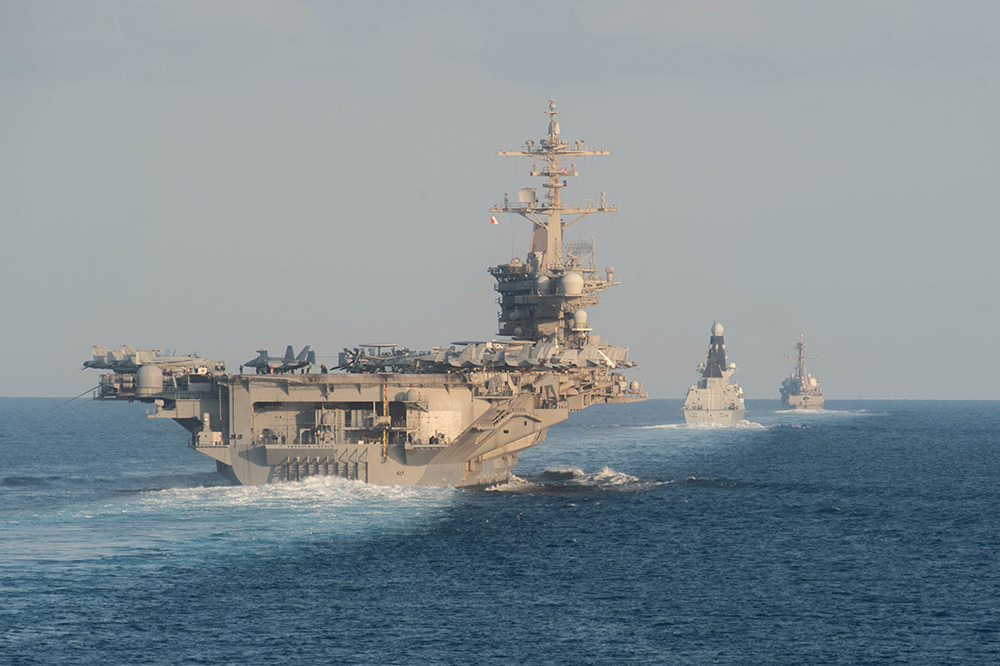
进入新的一周,石油交易员面临的情况是,世界已经发生巨变。在哈马斯发动突然袭击后,战争突然爆发,以色列宣布进入“战争状态”,市场恐慌情绪和不确定性可能会推高原油价格。
III Capital Management公司首席经济学家卡里姆·巴斯塔(Karim Basta)对路透社表示:“这场冲突带来了油价上涨的风险,也给通胀和经济增长前景带来了风险。”
对冲基金经理、顶级能源交易员皮埃尔·安杜兰德(Pierre Andurand)周日在X上指出,很多人问他“哈马斯对以色列的袭击是否会对油价产生影响”。
虽然安杜兰德预计这场冲突在未来几天内不会对石油供应产生重大影响,油价也不会大幅飙升,但他承认,全球石油库存处于低位,“沙特和俄罗斯的减产将导致未来几个月内库存进一步减少。市场最终将不得不乞求沙特增加供应,我认为,这在布伦特原油价格低于每桶110美元的情况下是不可能发生的。”
布伦特原油目前的价格约为每桶88美元,自以色列遭受袭击以来,油价已经上涨逾3%。今年9月,美国能源情报署(U.S. Energy Information Administration)发布了短期能源展望,称由于沙特将减产延长至年底,该机构预计第四季度原油价格为“平均每桶93美元”,随着库存增加,原油价格将从明年开始下跌。
当然,这是在本周末冲突爆发之前的预测。该机构的下一份展望报告将于本周发布。
安杜兰德指出,由于制裁执行不力,“在过去6个月里,我们发现伊朗的供应量大幅增加”。
当然,伊朗是哈马斯的重要支持者,鉴于此,安杜兰德认为,拜登政府“很有可能”开始对伊朗石油出口实施更严格的制裁措施。他写道,这将“进一步收紧石油市场”。
加拿大皇家银行资本市场(RBC Capital Markets)首席大宗商品策略师、前中央情报局(CIA)分析师赫利玛·克罗夫特(Helima Croft)告诉彭博社:“伊朗仍然是一个巨大的未知数。以色列将升级其对伊朗的长期影子战争,无法预测的是伊朗将如何应对这种升级。”
据彭博社报道,2011 年对伊朗实施制裁时,伊朗威胁要封锁霍尔木兹海峡(这条狭窄的航道输送着全球约三分之一的石油(水运))。伊朗放弃了这一威胁,而美国则密切监视该航道是否有被破坏的迹象。但这种情况发生的可能性,无论多么极端,都暗示了交易员所面临的不确定性。
风险投资公司Social Capital的首席执行官查马斯·帕里哈皮提亚(Chamath Palihapitiya)表示,油价势必会飙升,他在周日写道:“在两场热战(以色列-哈马斯冲突和俄乌冲突)以及欧佩克(OPEC)减产150万桶、战略石油储备(SPR)与上世纪 80 年代中期水平持平的背景下,油价怎么可能不再次飙升呢?”
位于芝加哥的价格期货集团(Price Futures Group)的分析师菲尔·弗林(Phil Flynn)对市场观察网(MarketWatch)表示:“肯定会出现恐慌交易。虽然短期内不会对供应产生直接影响,但显而易见的是,未来24到48小时内的事态发展可能会改变这一情况。”(财富中文网)
译者:中慧言-王芳
进入新的一周,石油交易员面临的情况是,世界已经发生巨变。在哈马斯发动突然袭击后,战争突然爆发,以色列宣布进入“战争状态”,市场恐慌情绪和不确定性可能会推高原油价格。
III Capital Management公司首席经济学家卡里姆·巴斯塔(Karim Basta)对路透社表示:“这场冲突带来了油价上涨的风险,也给通胀和经济增长前景带来了风险。”
对冲基金经理、顶级能源交易员皮埃尔·安杜兰德(Pierre Andurand)周日在X上指出,很多人问他“哈马斯对以色列的袭击是否会对油价产生影响”。
虽然安杜兰德预计这场冲突在未来几天内不会对石油供应产生重大影响,油价也不会大幅飙升,但他承认,全球石油库存处于低位,“沙特和俄罗斯的减产将导致未来几个月内库存进一步减少。市场最终将不得不乞求沙特增加供应,我认为,这在布伦特原油价格低于每桶110美元的情况下是不可能发生的。”
布伦特原油目前的价格约为每桶88美元,自以色列遭受袭击以来,油价已经上涨逾3%。今年9月,美国能源情报署(U.S. Energy Information Administration)发布了短期能源展望,称由于沙特将减产延长至年底,该机构预计第四季度原油价格为“平均每桶93美元”,随着库存增加,原油价格将从明年开始下跌。
当然,这是在本周末冲突爆发之前的预测。该机构的下一份展望报告将于本周发布。
安杜兰德指出,由于制裁执行不力,“在过去6个月里,我们发现伊朗的供应量大幅增加”。
当然,伊朗是哈马斯的重要支持者,鉴于此,安杜兰德认为,拜登政府“很有可能”开始对伊朗石油出口实施更严格的制裁措施。他写道,这将“进一步收紧石油市场”。
加拿大皇家银行资本市场(RBC Capital Markets)首席大宗商品策略师、前中央情报局(CIA)分析师赫利玛·克罗夫特(Helima Croft)告诉彭博社:“伊朗仍然是一个巨大的未知数。以色列将升级其对伊朗的长期影子战争,无法预测的是伊朗将如何应对这种升级。”
据彭博社报道,2011 年对伊朗实施制裁时,伊朗威胁要封锁霍尔木兹海峡(这条狭窄的航道输送着全球约三分之一的石油(水运))。伊朗放弃了这一威胁,而美国则密切监视该航道是否有被破坏的迹象。但这种情况发生的可能性,无论多么极端,都暗示了交易员所面临的不确定性。
风险投资公司Social Capital的首席执行官查马斯·帕里哈皮提亚(Chamath Palihapitiya)表示,油价势必会飙升,他在周日写道:“在两场热战(以色列-哈马斯冲突和俄乌冲突)以及欧佩克(OPEC)减产150万桶、战略石油储备(SPR)与上世纪 80 年代中期水平持平的背景下,油价怎么可能不再次飙升呢?”
位于芝加哥的价格期货集团(Price Futures Group)的分析师菲尔·弗林(Phil Flynn)对市场观察网(MarketWatch)表示:“肯定会出现恐慌交易。虽然短期内不会对供应产生直接影响,但显而易见的是,未来24到48小时内的事态发展可能会改变这一情况。”(财富中文网)
译者:中慧言-王芳
Oil traders face a changed world heading into the new week. With the sudden eruption of war in Israel, following surprise attacks by Hamas, fear and uncertainty in markets could drive up crude oil prices.
“The conflict poses a risk of higher oil prices, and risks to both inflation and the growth outlook,” Karim Basta, chief economist at III Capital Management, told Reuters.
Hedge-fund manager Pierre Andurand, a top energy trader, noted on X on Sunday that many people had asked him “if the Hamas attacks on Israel will have an impact on oil prices.”
While Andurand does not expect a big impact on oil supply or a large price spike in the next few days, he acknowledged that global oil inventories are low “and the Saudi and Russian production cuts will lead to more inventories draws over the next few months. The market will eventually have to beg for more Saudi supply, which I believe, will not happen sub $110 Brent.”
Brent crude is currently priced at about $88, having jumped more than 3% since the attacks on Israel. In September, the U.S. Energy Information Administration offered its short-term energy outlook, writing that with Saudi Arabia’s extended production cut through year’s end, its forecast “averages $93 dollars per barrel” in the fourth quarter, with price declines beginning next year as inventories build.
Of course, that was before this weekend’s eruption of violence. The agency’s next outlook is due this week.
Andurand noted that “over the last 6 months we have seen a very large increase in Iranian supply” due to the weak enforcement of sanctions.
Iran, of course, is a big backer of Hamas, and, given that, Andurand believes there’s a “good probability” that the Biden administration will begin more strictly enforcing sanctions on Iranian oil exports. That would “further tighten the oil market,” he wrote.
“Iran remains a very big wild card,” Helima Croft, chief commodities strategist at RBC Capital Markets and a former CIA analyst, told Bloomberg. “Israel will escalate its long-running shadow war against Iran” and “what is unpredictable is how Iran would respond to such an intensification.”
When sanctions were imposed on Iran in 2011, the country threatened to block the Strait of Hormuz, a narrow shipping route that handles roughly a third of the world’s waterborne oil, according to Bloomberg. Iran backed away from the threat, with the U.S. closely monitoring the waterway for signs of disruption. But the possibility of such a scenario, however extreme, hints at the kind of uncertainty traders face.
Chamath Palihapitiya, CEO of VC firm Social Capital, suggested oil prices were bound to jump, writing on Sunday: “How does oil not spike again now on the back of two hot wars (Israel-Hamas and Russia-Ukraine) and a 1.5M barrel production cut by OPEC with an SPR [Strategic Petroleum Reserves] that is at the same level it was in the mid 1980s?”
“There is definitely going to be a fear trade put in place,” Phil Flynn, analyst at Price Futures Group in Chicago, told MarketWatch. “While in the short term there is no impact directly on supply, it’s obvious how things play out over the next 24 to 48 hours could change that.”






